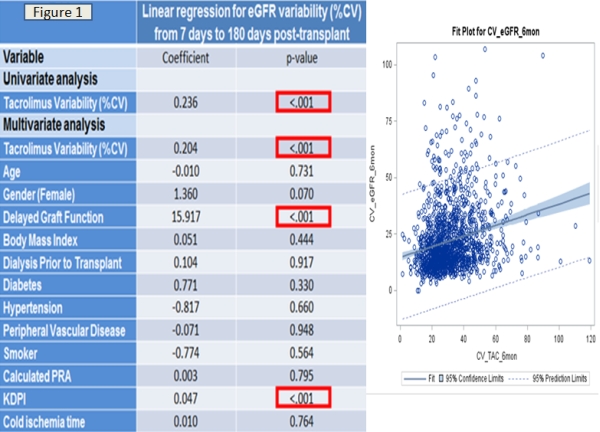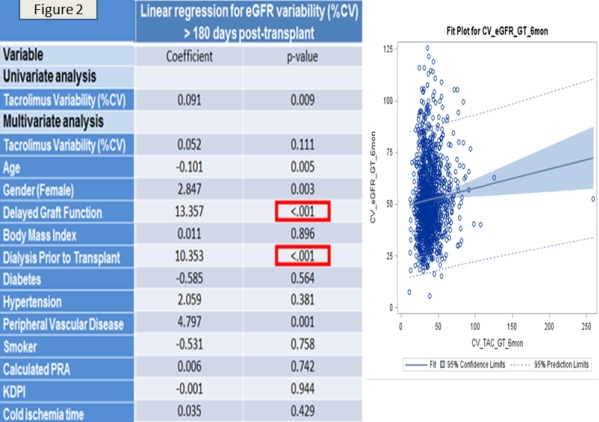Predicting Early and Late eGFR Variability in Kidney Transplant Recipients
Department of Medicine and Department of Surgery, MUSC, Charleston, SC.
Meeting: 2018 American Transplant Congress
Abstract number: D102
Keywords: Donors, Immunosuppression, marginal
Session Information
Session Name: Poster Session D: Kidney Complications: Late Graft Failure
Session Type: Poster Session
Date: Tuesday, June 5, 2018
Session Time: 6:00pm-7:00pm
 Presentation Time: 6:00pm-7:00pm
Presentation Time: 6:00pm-7:00pm
Location: Hall 4EF
Introduction: eGFR variability is a known risk factor for graft loss. It is unclear what modifiable factors are significantly associated with this variability and if these differ based on post-transplant period.
Methods: Single-center, retrospective longitudinal cohort study included 1,522 of adult kidney transplants between 2007 and 2016. Detailed demographics, postoperative clinical variables and outcomes were abstracted from electronic health records. Univariate and multivariate analyses were used to determine correlations between baseline and follow up clinical data and eGFR variability, stratified by post-transplant time (early: ≤6 months vs. late: >6 months post-transplant). Variability (%CV) was defined as the ratio of the standard deviation to the mean during the specified post-transplant period.
Results: Early eGFR variability was significantly correlated with tacrolimus trough variability and baseline demographics, particularly delayed graft function (DGF) and donor marginality (KDPI); 23% of the variability in early eGFR could be accounted for using these factors (Figure 1).  In the late period, the model had limited predictability, with 18% of the eGFR variability being able to be determined through baseline and follow up factors. DGF and years on dialysis were the only factors significantly correlated to eGFR variability in the late period (Figure 2).
In the late period, the model had limited predictability, with 18% of the eGFR variability being able to be determined through baseline and follow up factors. DGF and years on dialysis were the only factors significantly correlated to eGFR variability in the late period (Figure 2). 
Conclusion: This study demonstrates that within 6 months post-transplant, eGFR variability was significantly correlated with tacrolimus variability, DGF and KDPI. After 6 months, eGFR variability was correlated with DGF and time on dialysis. Baseline and clinical factors appear to be better at explaining early eGFR variability vs. late variability.
CITATION INFORMATION: Soliman K., Taber D., Zemin S., Rao V. Predicting Early and Late eGFR Variability in Kidney Transplant Recipients Am J Transplant. 2017;17 (suppl 3).
To cite this abstract in AMA style:
Soliman K, Taber D, Zemin S, Rao V. Predicting Early and Late eGFR Variability in Kidney Transplant Recipients [abstract]. https://atcmeetingabstracts.com/abstract/predicting-early-and-late-egfr-variability-in-kidney-transplant-recipients/. Accessed February 13, 2026.« Back to 2018 American Transplant Congress
